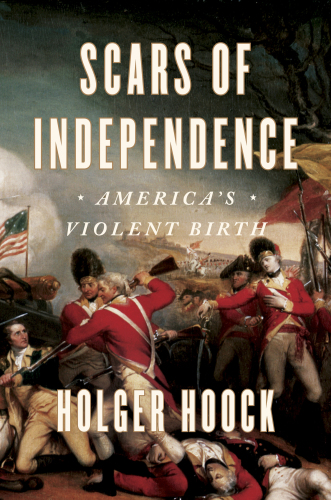
Scars of Independence
America's Violent Birth
فرمت کتاب
ebook
تاریخ انتشار
2017
Lexile Score
1340
Reading Level
11-12
نویسنده
Holger Hoockناشر
Crownشابک
9780804137294
کتاب های مرتبط
- اطلاعات
- نقد و بررسی
- دیدگاه کاربران
نقد و بررسی

March 20, 2017
In this detailed account of the American Revolution, Hoock (Empires of the Imagination), professor of history at the University of Pittsburgh, recovers the central role of violence in shaping the revolutionary experience. Arguing that existing historical narratives elide the conflict’s pervasive emotional, physical, and psychological traumas, Hoock attends to the violent acts and rhetoric that affected communities on both sides of the war, taking care to discuss the revolution’s effects on white women, Native Americans, and enslaved people as well as the white men in power. In each chapter, he examines a related set of violent stories, including British attacks on American soldiers, the torture and oppression of loyalists, sexual assaults against women, and military genocide against Native Americans. Hoock does not shy away from graphic depictions of violence; his history seethes with descriptions of people being beaten, wounded, tarred and feathered, and worse. The gruesome accuracy of these scenes reflects both Hoock’s painstaking archival work and his commitment to calling this past to account, but some readers may find it challenging to engage fully with the book’s catalogue of suffering. Nonetheless, Hoock strikes an effective balance between description and broader historical analysis, crafting a gripping narrative that holds appeal for general audiences and historians alike. Agent: Susan Rabiner, Susan Rabiner Literary.

Starred review from March 1, 2017
The American Revolution was no festive musical.German-born historian Hoock (British History/Univ. of Pittsburgh; Empires of the Imagination: Politics, War, and the Arts in the British World, 1750-1850, 2010, etc.) asserts that this is "the first book on the American Revolution and the Revolutionary War to adopt violence as its central analytical and narrative focus." Over time, he writes, the Revolution's pervasive violence and terror have "yielded to a strangely bloodless narrative of the war that mirrors the image of a tame and largely nonviolent Revolution." In fact, he claims in this fresh approach to a well-trod subject, "to understand the Revolution and the war--the very birth of the nation--we must write the violence, in all its forms, back into the story." This he certainly does, examining both physical and psychological violence inflicted by all participants--British, German and colonial military forces, Patriot and Loyalist partisans and civilians, Native Americans, and free and enslaved blacks--on each other throughout the conflict. The catalog of misery includes battlefield atrocities, rape and plunder of civilians, inhumane imprisonment, lynchings and expulsions, and the scorched-earth destruction of crops, plantations, and entire towns. Hoock suggests that the conflict is best understood as America's first civil war rather than as a colonial uprising. He also considers at length the struggles by civil and military leaders of both sides to determine what levels of violence would be efficacious in achieving their objectives and acceptable under contemporary ethical standards, issues of continuing relevance today. Deeply researched and buttressed by extensive useful endnotes, this is history that will appeal to both scholars and general readers. The author presents his grim narrative in language that is vivid without becoming lurid. In urging an acceptance of historical accuracy over our foundational myths, he hopes to direct us toward "an approach to global leadership...more restrained, finely calibrated, and generously spirited." An accomplished, powerful presentation of the American Revolution as it was, rather than as we might wish to remember it.
COPYRIGHT(2017) Kirkus Reviews, ALL RIGHTS RESERVED.

Starred review from March 1, 2017
The virtue of this well-researched work by Hoock (history, Univ. of Pittsburgh; Empires of the Imagination) is to show how the attempts to inhibit the use of violence influenced the direction of the Revolutionary War and its eventual outcome. Violence grew in severity and frequency as the conflict progressed. According to the author, President George Washington viewed the conflict as a war for American honor. The general-turned-president took steps, not always successful, to restrain his troops from brutality. Congress appointed a commission to investigate and report on abuses, an innovation in the assessment of war crimes. The Patriots handily won the ensuing propaganda dispute over abuses. Other topics detailed in this comprehensive study include the treatment of prisoners of war, Britain's employment of German mercenaries, as well as their recruitment of black slaves in the South and Native tribes in the West, and British and Patriot massacres of enemy troops. VERDICT Hoock has written a history of violence in the Revolutionary War that is as fascinating as it is enlightening.--David Keymer, Modesto, CA
Copyright 2017 Library Journal, LLC Used with permission.

























دیدگاه کاربران